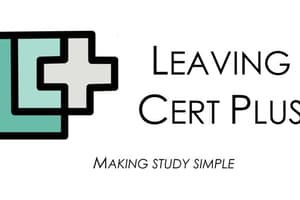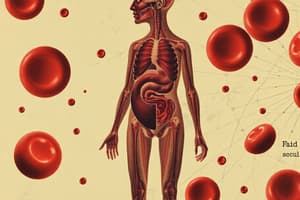Podcast
Questions and Answers
Which component of blood is primarily responsible for transporting oxygen?
Which component of blood is primarily responsible for transporting oxygen?
- Plasma
- Platelets
- White blood cells
- Red blood cells (correct)
What is the primary function of white blood cells?
What is the primary function of white blood cells?
- Defense against bacteria (correct)
- Transport gases
- Maintain blood pressure
- Aid in blood clotting
Which type of blood vessel carries oxygen-poor blood back to the heart?
Which type of blood vessel carries oxygen-poor blood back to the heart?
- Veins (correct)
- Capillaries
- Arteries
- Aorta
What role do platelets play in the blood?
What role do platelets play in the blood?
Which blood type is considered the universal donor?
Which blood type is considered the universal donor?
Gregor Mendel is recognized for his contributions to which field of genetics?
Gregor Mendel is recognized for his contributions to which field of genetics?
What is the lifespan of a typical red blood cell?
What is the lifespan of a typical red blood cell?
Which component of blood is primarily involved in the clotting process?
Which component of blood is primarily involved in the clotting process?
Which of the following is NOT a type of white blood cell?
Which of the following is NOT a type of white blood cell?
What is the primary focus of Molecular Genetics?
What is the primary focus of Molecular Genetics?
Flashcards are hidden until you start studying
Study Notes
Components of Blood
- Plasma: Nonliving component over 90% water; contains proteins, salts, and materials for transport.
- Fibrinogen: A plasma protein essential for the blood clotting process.
- Red Blood Cells (RBC): Also known as erythrocytes; transport oxygen and carbon dioxide via hemoglobin; average lifespan of 100-120 days; produced in red marrow of flat and long bones.
- White Blood Cells (WBC): Known as leukocytes; defend the body against bacteria; lifespan of 13-20 days; larger but fewer than RBCs.
- Classification of WBC:
- Granulocytes: Neutrophils, eosinophils, basophils.
- Agranulocytes: Lymphocytes and phagocytes.
- Phagocytes: Ingest bacteria and foreign substances; play a protective role.
- Lymphocytes: Produce antibodies against foreign bodies; created in lymph nodes; lifespan of 4 hours to 10 days.
- Platelets: Also called thrombocytes; crucial for blood clotting; prevent bleeding and RBC leakage; lifespan of 3-5 days.
- Hemocytoblasts: Special connective tissues where all blood cells (RBC, WBC, platelets) are formed.
Blood Types
- Karl Landsteiner: Discovered blood antigens (A & B) and antibodies (anti-A & anti-B) in human blood.
- Serum: Blood plasma without clotting factors like fibrinogen.
- Four Main Blood Types:
- Type A
- Type B
- Type AB: Universal recipient, can receive blood from any type.
- Type O: Universal donor, can be given to any type.
Blood-Letting
- Historical medical practice involving the withdrawal of small amounts of blood from patients.
Types of Blood Vessels
- Arteries: Carry oxygen-rich blood away from the heart; have thick, elastic walls to handle high pressure; the aorta is the largest artery.
- Veins: Transport oxygen-poor blood back to the heart; have thin walls and valves to prevent backflow; the inferior and superior venae cavae are the largest veins.
- Capillaries: Connect arteries and veins; facilitate the exchange of gases and small molecules between blood and body cells.
Genetic Studies
- Genetics: Study of heredity information and inheritance mechanisms.
- Heredity: Transmission of traits from parents to offspring.
- Variations: Differences among individuals of the same species.
Three Branches of Genetics
- Mendelian / Classical Genetics: Basic inheritance laws proposed by Gregor Mendel.
- Molecular Genetics: Focuses on the biochemical aspects of genes and inheritance mechanisms.
- Population Genetics: Examines gene behavior in populations and environmental impacts on gene frequency.
Gregor Johann Mendel
- Known as the father of genetics; entered a monastery at 21 and became a priest four years later.
- Conducted pioneering breeding experiments using garden peas to study inheritance.
- Initially received little recognition for his work presented to the Natural History Society.
Studying That Suits You
Use AI to generate personalized quizzes and flashcards to suit your learning preferences.




